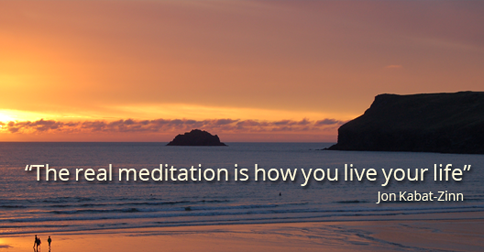HJ: Mindfulness is the art of detaching from your thoughts and therefore the suffering they invariably generate. By doing so you drop into a deeper state of consciousness which gives rise to higher states of emotional intelligence and awareness, such as peace, happiness, contentment, joy, compassion and so on. You begin to tap into and reveal your true self. Below you will find a great article by the always wise Ronald Alexander musing on some quick but powerful ways to drop into deeper levels of peace in your life through the power of mindfulness, based solidly on timeless noble truths from Buddhist philosophy.
– Truth
The Art of Mindfully Transforming Your Life
Learn to let go of your attachments with the Buddha’s Four Noble Truths.
By Ronald Alexander, Ph.D. | Psychology Today
—
Twenty-five hundred years ago, the Buddha was like the first psychologist, teaching his followers about the power of changing their mental processes in order to alleviate emotional discomfort and embrace change. One of his insights were the four noble truths that helped people free themselves from the patterns of thinking and behaving that perpetuate their suffering.
By looking at these four central tenets of Buddhism we can better understand how micromanaging our circumstances can cause us to become agitated and restricted. Instead when we learn to let go of our attachments we can transform our lives in an innovative way.
The four noble truths can help us break out of the need to be in control and, instead enter into an acceptance of the present moment. Only in the present will we find the courage to cross the threshold of the unknown and relax into the changes we cannot avoid. I find it helpful to take a mindful pause throughout the day and check in with one or more of them. It’s a lovely compass to follow.
Here are the four noble truths from my book, Wise Mind, Open Mind and how they can help you let go of resistance and move forward out of your dilemma.
The first noble truth: In life, there is suffering, because of the impermanent nature of things.
Because we feel more secure when we have a sense of predictability, we develop a great capacity for denying a simple truth: that nothing stays the same. Then the unpredictability of life shows us that even if we do everything “right” and exercise every precaution, we can still face unexpected loss.
When this happens the shock can make it hard to regain your equanimity and exercise nonreactvity. Too often, rather than surrender to the inevitability of change and work creatively with it, people resort to the fear-based behavior of trying to take charge and force other people and situations to conform to their expectations. The first noble truth of Buddhism is a reminder not to slip into the avoidance behavior of denial. While it’s not wise to create gloomy thoughts about how matters might take a turn for the worse, consciously ignoring the reality that all situations transform sets you up for a great shock when that time comes.
The second noble truth: Suffering is due to attachments and expectations, to grasping and clinging.
Your inability to avoid change may make you angry, sad, and frustrated. It can be hard to let go of the false belief that the only way to achieve happiness again is to regain what’s been lost. Even when you know you can’t reverse the situation, you may agonize over this reality.
Clinging to what once was, avoiding the process of grief and acceptance, causes paralysis. Grasping for a future set of circumstances identical to the past holds you back from discovering what better roads lie ahead, outside of your sight. The desire to backtrack or reconstruct will likely result in your walking around in circles, lost in the dark woods, instead of peering around corners to find new paths.
The third noble truth: It’s possible to end suffering by giving up attachments (clinging) and expectations (grasping)
The shift in perspective that comes when we recognize that there’s no such thing as a permanent sense of happiness begins our healing from suffering. The next step is to accept that we must broaden our definition of what we need in order to be happy, giving up the habits of clinging and grasping, as well as the need to control external circumstances.
After emerging from the shock of a great loss, we’re even more despairing about the possibility of being joyful again. However, the third noble truth offers us the promise of a new way of living that’s as satisfying, if not more fulfilling, than the old. It beckons us to begin the process of transformation.
The fourth noble truth: The way to end suffering due to clinging and grasping is through balance and living in the present.
It’s important to balance a thirst for something better with an acceptance of what is, right now. Balance allows you to live in the present moment and trust that your acceptance will clear the mist of confusion and distractions, and show you the way to move forward into happiness again. Here’s the paradox of change: until you can accept what is, you cannot move into what might be.
When we cling to the past or what no longer serves us, we contract ourselves to the point where we’re unable to be nourished and invigorated by the present moment. We have to accept that what’s past has truly passed in order to open up to what the present moment offers us. In this opening we become nourished, refreshed and revitalized.













